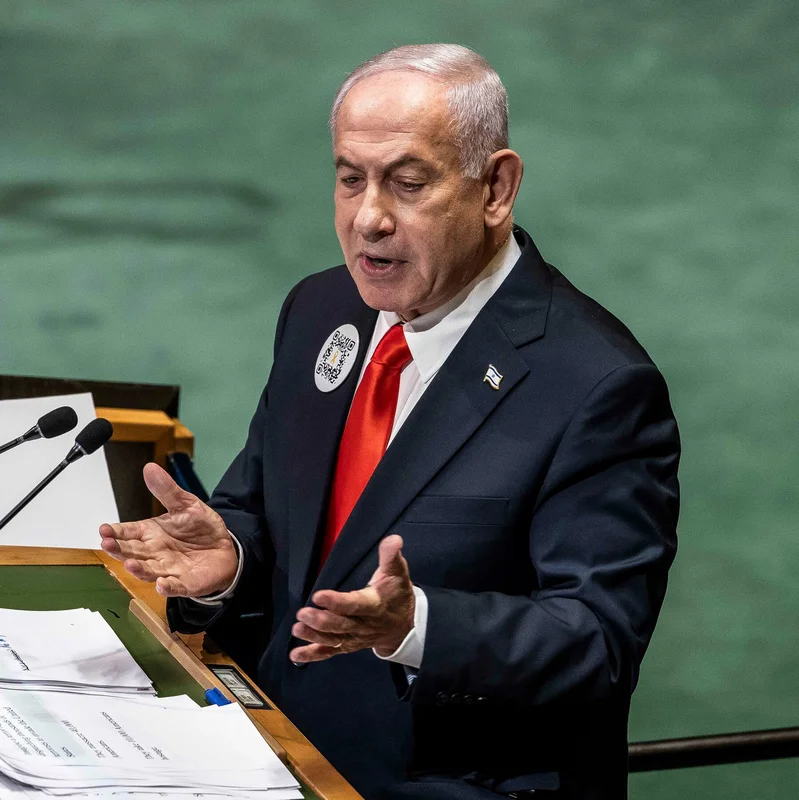During his address to the United Nations General Assembly on September 26, 2025, Israeli Prime Minister Benjamin Netanyahu made a striking visual statement: a large lapel pin featuring a QR code that links directly to graphic footage of the October 7, 2023 Hamas-led attacks on southern Israel . The move, part of a broader Israeli public diplomacy campaign in New York, aimed to refocus global attention on the atrocities that ignited the ongoing war in Gaza .
A Calculated Symbol in a High-Stakes Speech
Standing at the UN podium, Netanyahu explicitly called on attendees to scan the code. “You see this large pin here? It’s a QR code. What I ask you to do is hold up your phones,” he said, urging the international community to “remember October 7th too” . The linked content includes raw, disturbing video evidence of the attacks that killed approximately 1,200 people and led to the abduction of over 250 hostages .
Netanyahu’s History of UN Visual Aids
This isn’t Netanyahu’s first use of props at the UN. Known for his theatrical diplomacy, he previously held up a cartoonish bomb diagram in 2012 to illustrate Iran’s nuclear program and used a map with multiple-choice questions in 2023 . The 2025 QR code continues this tradition—but with a digital twist tailored for the social media age .
Global Reaction: Support, Criticism, and Walkouts
The speech—and the QR code—sparked polarized responses:
- Supporters praised the move as a bold effort to counter what they describe as global amnesia about October 7.
- Critics condemned the use of graphic imagery as manipulative and inappropriate for a diplomatic forum.
- Diplomatic walkouts were reported during the speech, reflecting Israel’s growing isolation at the UN [[3][8]].
Timeline of Netanyahu’s UN Visual Tactics
| Year | Visual Aid | Target Issue | Global Response |
|---|---|---|---|
| 2012 | Red marker drawing on cartoon bomb | Iran’s nuclear program | Widely mocked but memorable |
| 2023 | Map with multiple-choice questions | Hamas-Israel conflict | Mixed; seen as combative |
| 2025 | QR code lapel pin | October 7 attacks | Polarized: praised by allies, criticized by diplomats |
Why a QR Code? The Strategy Explained
In an era of information overload and short attention spans, the QR code serves as a direct, immediate gateway to Israel’s narrative. By embedding evidence in a scannable format, Netanyahu’s team bypasses traditional media filters and speaks directly to global citizens—and journalists—via their smartphones .
The QR code symbolizes a fusion of diplomacy and digital storytelling in the 21st century.
While the tactic underscores Israel’s effort to shape the narrative around the Gaza war, it also highlights the deepening divide in international opinion. For North American audiences, where support for Israel remains relatively strong but increasingly nuanced, the move has reignited debates about accountability, memory, and the ethics of visual advocacy in global forums [[INTERNAL_LINK:israel-gaza-conflict-explained]].
Sources
- The New York Times – Netanyahu Wears QR Code Referencing Oct. 7 During U.N. Speech
- The Times of Israel – Netanyahu’s UN Pin Features QR Code Linking to Oct. 7 Footage
- Reuters – UN General Assembly 2025: Diplomats Storm Out During Netanyahu Speech
- BBC News – Full Text and Analysis of Netanyahu’s 2025 UN Address




